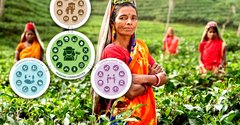
IKEA Foundation Agricultural Livelihoods Team
Client > A Better Everyday Life

Our vision is to create a better everyday life for the many people who share this planet. To achieve that better life, we have to address the systems of inequality that we operate in. We simply cannot move forward without acknowledging the many intersecting inequalities that our economies and societies create.
IKEA Foundation is committed to tackling some of the root causes of inequality: poverty, the consequences of climate change, and lack of resources such as clean air, energy, and fertile land. Families need both financial stability and a healthy environment if they and their children are to thrive. Improving livelihoods and protecting the planet are inseparable.
Through our grantmaking, we work with our partners to help people and communities with the fewest resources build livelihoods and support their families. Our learning has been that to create a lasting impact, we need to actively seek ways to engage in dialogue and collaboration with local organisations and communities.
Beyond our grantmaking, it’s also important that different perspectives and pathways are represented and understood. We are committed to amplifying the voices of partners and local communities to ensure a fair, inclusive, and balanced debate around each of the areas where we operate: agricultural livelihoods, refugee livelihoods, employment and entrepreneurship, access to renewable energy, and climate action.
If we are to be successful, ending inequality should be central to everything we do.
Agricultural Livelihoods
We think that agriculture is a great sector of growth and innovation, where farmers and entrepreneurs are the creators, change agents and leaders of the coming decades.
That’s why we want to regenerate the agricultural landscape, so farming and agribusiness are seen as viable and noble career options that not only feed the world but also enable people to afford a better life for themselves and their families. Growing the world’s food should be something people aspire to, not simply for altruistic reasons but for a very practical one: because it financially supports them, their families, and their communities.
But profitability cannot come at the expense of the planet that sustains us, so we take a planet-positive approach to agriculture. With agriculture both contributing to and being affected by climate change, we prioritise agriculture that regenerates resources, protects ecosystems and enhances biodiversity.
